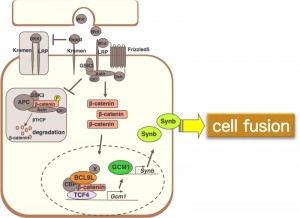Novel insights into the biology of cell fusion Regulation of cell fusion through Wnt signaling

Cell fusion has a critical role in various developmental processes, immune response, tissue homeostasis and regeneration, and possibly, in cancer. However, the signals that regulate cell fusion remain poorly understood. Wnt/β-catenin signalling regulates cell fate, proliferation and the self-renewal of stem and progenitor cells, and has critical roles in cancer development and in the regeneration of various tissues.
In a screen for novel targets of Wnt/β-catenin signalling, Professor Tetsu Akiyama and his group at the University of Tokyo’s Institute of Molecular and Cellular BIosciences identified glial cells missing 1 (GCM1), which encodes a transcription factor that is involved in epigenetic regulation and is critical for the fusion of syncytiotrophoblast (ST) cells.
Akiyama’s group show that β-catenin/BCL9-Like (BCL9L)/T-cell factor 4 (TCF4) signalling directly targets the GCM1/syncytin pathway and thereby regulates the fusion of human choriocarcinoma cells. Additionally, the researchers have shown that the GCM1/syncytin-B pathway is significantly downregulated in the placenta of BCL9L-deficient mice and that the fusion and differentiation of ST-II cells are blocked.
These results demonstrate a signal transduction pathway that regulates cell fusion, and may provide intriguing perspectives into the various biological and pathological processes that involve cell fusion.
Press release (Japanese)
Paper
Ken Matsuura, Takafumi Jigami, Kenzui Taniue, Yasuyuki Morishita, Shungo Adachi, Takao Senda, Aya Nonaka, Hiroyuki Aburatani, Tsutomu Nakamura and Tetsu Akiyama,
“Identification of a link between Wnt/b-catenin signaling and the cell fusion pathway”,
Nature Communications, 2, 548 (2011). doi:10.1038/ncomms1551
Article link
Links
Institute of Molecular and Cellular Biosciences The University of Tokyo







